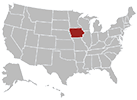
A Sterile Processing Technician (SPT) plays a pivotal role in medical facilities ensuring patient safety.
Their main responsibility is to ensure that all medical equipment is sterilized and ready for surgical procedures.
However, they also complete duties such as prepping tools and sanitizing surrounding areas.
Iowa residents who are looking to become an SPT can read further on how to become one.
Steps to Become a Sterile Processing Technician in Iowa
Becoming an SPT in Iowa is a straightforward process.
Unlike other career paths, an SPT in most states doesn’t require any certificate or schooling.
However, employers like to see certification as it shows that you’ve been properly trained.
In Iowa, it is not required to be licensed or have a certificate.
Step 1: First, Meet the Minimum Requirements
An SPT’s responsibilities are very important and have major consequences if not conducted properly.
So, the first step is to meet the minimum requirements of being age 18 and over.
After that, one will need to hold a high school diploma or have an equivalent.
A GED can be a supplementary diploma.
Step 2: Attend an Accredited Program or On-the-Job Training
While most SPT positions will require prior experience, there are entry-level jobs available.
In these settings, applicants will be expected to complete on-the-job training before they can work without supervision.
During this time, they will learn how to properly sterilize tools, upkeep equipment, and prepare instruments for surgery.
Alternatively, one can take an SPT certificate program from an accredited institution.
Accredited programs are essential, as they follow strict educational guidelines.
If one is planning to attend an SPT certificate program, make sure that it’s certified by the Certification Board for Sterile Processing and Distribution (CBSPD) or the International Association of Healthcare Central Service Material Management (IAHCSMM).
Step 3: Further Education or Gain Experience
One key element to becoming more experienced is either attending further educational programs or working on the job.
Those who are working on the job will be able to learn about more types of equipment and can even work in a higher-paid position.
To get hands-on experience, one can either work as an entry-level SPT or they can complete an internship.
In some cases, hospitals may hire students who are already attending a certificate program.
One can also get a similar certificate to an SPT, such as a Certified Registered Central Service Technician (CRCST) and a Certified Sterile Processing and Distribution Technician (CSPDT).
These programs are nearly identical, with both following the same type of training.
However, the main difference is that those programs will go more in-depth on certain subjects.
Step 4: Apply to Jobs
Individuals looking to become an SPT can apply for an entry-level job.
Whether you get hired will depend on prior training or a certificate.
Those who don’t have any prior experience will need to complete on-the-job training.
While some positions will offer on-the-job training, there are also hospitals where this isn’t possible.
More risky positions will not allow newly hired staff to work on their own.
Licensing Requirements to Become
Iowa doesn’t have any laws requiring one to have an SPT certificate to work.
Instead, those who won’t have a certificate will be available to apply for an entry-level position.
If one can not find an entry-level job, then it’s vital to get a certificate.
Not only will this help give a competitive edge, but it will also teach the necessary skills to complete the job successfully.
Sterile Processing Technician Programs in Iowa

Iowa Western Community College
The Iowa Western Community College sometimes has a sterile processing technician program running.
The course teaches how to sterilize medical instruments and covers some microbiology and infection subjects.
In addition, students will learn names and categories of medical equipment.
The tuition is estimated at $795 with a $150 non-refundable fee.

Des Moines Area Community College
Des Moines Area Community College (DMACC) offers similar training to that of an SPT, a sterile processing supply technician.
While the name is different, the training program covers most of the topics a SPT would learn.
The course includes 60 contact hours and 24 hours of career preparation.
Students who take this course will be able to sit for the SPT certification exam.
The course covers the history of the field, learning about the sterile processing department, and the healthcare system.
In addition, students will learn how to communicate effectively with other medical departments.
The course will also go over safety, rules, and regulations related to the job.
Lastly, students will also learn microbiology, disease transmission, decontamination, instrumentation, and preparation.
There are limited seats for this course, and they often go fast.
Applicants who want to attend will need to contact the school and register early or ask to join a waitlist.
The course tuition costs $639, which is due at the time of booking.

Iowa Valley Community College
The Iowa Valley Community College offers an online self-paced course offered by Ed2Go.
The program has open enrollment and trains students to sit for the Certified Registered Central Service Technician certificate provided by the HSPA.
The program consists of 190 course hours and takes 12 months to complete.
The program is designed to give complete knowledge of the sterile processor role and provide procedures, guidelines, and regulations.
The course also covers microbiology, disease transmission, decontamination, and preparation.
Students can expect tuition to be $3,290 for the course but may find it listed on sale.
If students can’t pay the full tuition upfront, students can apply for Affirm.
Affirm can help students pay as little as $136 per month for the program.
3 Sterile Processing Technician Schools in Iowa
| School Name | Address |
|---|---|
| Iowa Western Community College | 2700 College Rd, Council Bluffs, IA 51503, United States |
| Des Moines Area Community College | 1144 7th St, Des Moines, IA 50314, United States |
| Iowa Valley Community College | 123 6th Ave, Grinnell, IA 50112, United States |
Salary
A sterile processing technician in Iowa makes an average salary of $37,936.
On the low end, SPT will make $30,270.
However, those with more experience and education can make upward of $47,150.
The salary changes mainly based on location, education, and experience.
For example, those living in a large city compared to a remote area generally make more to match the cost of living.
Annual Salary Range:Average Salary of Sterile Processing Technicians in Iowa
| City Name | Salary |
|---|---|
| Altoona | $38,451 |
| Bellevue | $37,024 |
| Bridgewater | $38,094 |
| Chariton | $38,094 |
| Charlotte | $37,024 |
| Dexter | $38,094 |
| Des Moines | $38,451 |
| Gilbert | $38,094 |
| Hawkeye | $36,311 |
| Alexander | $36,311 |
Regional Salary
| Region | Employed | Avg. Annual Salary | Avg. Hourly Pay | Top 10% Annual Salary | Bottom 10% Annual Salary |
|---|---|---|---|---|---|
| Cedar Rapids, IA | 40 | $43,940 | $21.13 | $51,890 | $39,890 |
| Davenport-Moline-Rock Island, IA-IL | 50 | $42,860 | $20.60 | $54,690 | $35,990 |
| Des Moines-West Des Moines, IA | 110 | $44,050 | $21.18 | $53,960 | $37,750 |
| Iowa City, IA | 160 | $43,360 | $20.85 | $56,180 | $38,060 |
| Sioux City, IA-NE-SD | 40 | $41,400 | $19.90 | $45,640 | $36,920 |
| Waterloo-Cedar Falls, IA | 50 | $39,480 | $18.98 | $46,020 | $35,410 |
* Employment conditions in your area may vary.
Frequently Asked Questions
How quickly can I become a sterile processing technician in Iowa?
To become a sterile processing technician in Iowa will depend on the options available.
For example, students attending an SPT program will be fully trained in six months to a year depending on attendance and program length.
Alternatively, those trained on the job may find themselves trained in as little as a few weeks.
Is there a high demand for sterile processing technicians in Iowa?
The estimated growth of an SPT position is expected to grow at least 5% from 2020 to 2030.
This indicates that there will be more demand for the job as more medical facilities will be developed.
In addition, prior SPTs will be furthering their education or exiting the field.
So, there is a steady projected growth for the jobs in Iowa.
What are alternative programs for a sterile processing technician in Iowa?
A Certified Registered Central Service Technician (CRCST) or a Certified Sterile Processing and Distribution Technician (CSPDT) can also have adequate degrees to work as an SPT.
In addition, one may also attend a trainee position while working on the job.
However, most STPs end up in entry-level positions with on-the-job training.
Is a sterile processing technician certificate necessary in Iowa?
No, those looking to become a sterile processing technician won’t need a certificate.
Many job openings will offer on-the-job training.
That said, getting an SPT certificate can be beneficial in many ways, such as a competitive resume.
What hours can I expect to work as a sterile processing technician in Iowa?
The standard work week will look drastically different depending on the facility.
For example, some technicians may work a standard 40-hour work week.
However, there may also be those on-call for emergencies or those working odd shifts.
It’s expected that an SPT will work shifts that range from eight to twelve hours.
This page is also available in Spanish.





